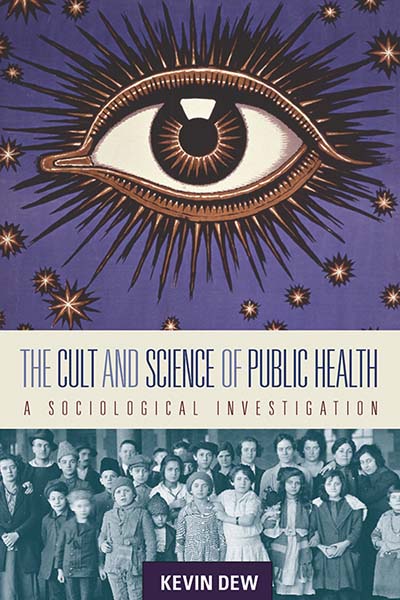With World Health Day coming up April 7, the paperback release of Kevin Dew’s exploration of public health is quite timely. The Cult and Science of Public Health: A Sociological Investigation was published originally in February 2012 and will be published as a paperback this month. Below is a brief description of the book, and the author’s reflection on its reception since the initial publication.
________________________________________________

As a cult of humanity, public health provides a moral force in society that replaces ‘traditional’ religions in times of great diversity or heterogeneity of peoples, activities and desires. This is in contrast to public health’s foundation in science, particularly the science of epidemiology. The rigid rules of ‘scientific evidence’ used to determine the cause of illness and disease can work against the most vulnerable in society by putting sectors of the population at a disadvantage.
This study focuses on this tension between traditional science and the changing vision articulated within public health that calls for a collective response to uncontrolled capitalism and unremitting globalization, and to the way in which health inequalities and their association with social inequalities provides a political rhetoric that calls for a new redistributive social programme.
______________________________________
Although Berghahn sends books out to be reviewed before publication it is something of an anxious time waiting to see how your peers will receive your work, and of course it takes a little time before reviews appear in journals – extending this period of disquiet. When the reviews started appearing I was delighted with the reviewers’ responses. It was also a great privilege to have my book the subject of an ‘author meets the critics’ symposium at the annual conference of the Sociological Association of Aotearoa/New Zealand.
Scholars whom I greatly admire took my book as a starting point to reflect on their own engagements with public health research and suggest new directions for further investigation. Geoff Fougere captured the argument in my book very succinctly in describing public health as a “promiscuous assemblage” but also as a contemporary engine of critique. Indeed public health provides a powerful critique of contemporary policy and as such can act as a source of social change. It has a privileged position in this regard as it can lay claim to offering this critique on the basis of science, with its cultural legitimacy and appeals to objectivity. This does not mean that, as sociologists, anthropologists and other academics delving into public health, that we should embrace it in all its many facets. Public health can be enrolled to perpetuate injustices, as it has done in the past, and we must be alert for how that might continue today.
I have also had opportunity to further consider how writing the book helped me come to a different sort of understanding of my own work and the work of public health. Although I am now working in a sociology and social policy programme, when I first started putting this book together I was based in a department of public health at a medical school. Being a sceptical sort of sociologist I found this perspective difficult to sustain in an environment where my colleagues were devoting themselves to improving people’s lives through health and policy interventions.
How can one maintain a scepticism that may undermine this good work? But the theoretical orientation I came to, drawing on the work of Durkheim, made me more comfortable in my position and in my work. If public health acts in ways similar to a cult of humanity in a Durkheimian sense, then the challenge of a sceptical scientific point of view is essential to combat the ‘absolutist’ tendencies of public health. For me this is not to undermine public health, but to strengthen it in its mission to promote social justice through the mechanisms of health and the understanding derived from epidemiology – particularly its social variant.
For me, the sociologist, public health’s strength is not derived from its promiscuity in re-shaping society in its own image, but from advancing its role as an engine of critique.
_______________________________________
Kevin Dew is Professor of Sociology in the School of Social and Cultural Studies at Victoria University of Wellington, New Zealand. In 2007 he was awarded the inaugural scholarship award from the Sociological Association of Aotearoa/New Zealand for contributions to New Zealand sociology.
